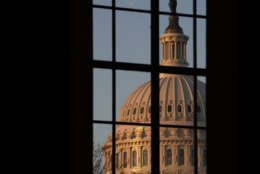Hubbard Radio Washington DC, LLC. All rights reserved. This website is not intended for users located within the European Economic Area.
On Air: Federal News Network
COLA
-
Federal Managers Association President Renee Johnson and FMA Government and Public Affairs Director Greg Stanford join host Mike Causey on this week's Your Turn to discuss what their organization is doing to help secure a 1.9 percent pay raise for white collar feds. September 26, 2018
September 26, 2018 -
With 43 days until the midterm elections and five days from the fiscal new year, a 1.9 percent pay raise for white collar feds is looking good.
September 25, 2018 -
The Trump administration wants to cut costs in the giant federal retirement program by totally eliminating future COLAs for FERS retirees. If it becomes law the 2019 COLA would be the last.
September 19, 2018 -
Many who have been comfortably stationed in Washington for decades are literally running for their political lives this year.
August 28, 2018 -
Are you retiring at the first opportunity? Or are you planning to work extra because you like the job or your coworkers and want to build your annuity?
August 10, 2018 -
Today the House is in recess until after Labor Day. Proposed changes in FERS, which would require you to pay 6 percent more for the benefit while cost of living adjustments would be eliminated for retirees, seem less urgent.
August 06, 2018 -
With three months left to go in the cost-of-living adjustment countdown clock, federal/military/Social Security retirees are looking at a January inflation-catch up of 2.7 percent.
July 13, 2018 -
The Trump administration wants to make the federal retirement plan more costly to workers and less valuable to retirees. But officials could probably "drain the swamp" of thousands of bureaucrats if they made the changes effective later rather than sooner.
June 14, 2018 -
In today's Federal Newscast, bipartisan legislation in the Senate would shorten the deadline for the Defense department to pay defense contractors who work with small businesses.
May 24, 2018 -
If any of the Trump administration’s proposals to overhaul the federal pay and pension plans make it through Congress, thousands of federal workers might have to extend their tours of duty by as much as a decade to maintain their standard of living.
May 21, 2018 -
The Professional Managers Association is telling fed-postal-retirees to stay alert as federal retirement contribution changes are proposed by the Trump administration.
May 18, 2018 -
Jeff Neal, former DHS CHCO, looks at the recent proposals from OPM and OMB that would freeze federal pay for a year and decrease federal employee compensation.
May 17, 2018 -
The Trump administration's plan to totally eliminate inflation protection for federal retirement, while requiring workers to pay more for smaller lifetime retirement benefits, is the ultimate deal-breaker for most people.
May 17, 2018 -
Federal News Radio explains each of OPM's proposed changes to the federal retirement system and details their outlook in Congress.
May 15, 2018















